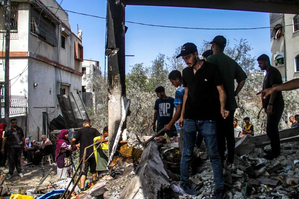Lack of essentials in Gaza leads to increase in preventable diseases: UN

United Nations, June 27 (IANS) UN humanitarians said that its partners delivering health aid in Gaza reported a spike in preventable diseases linked to a lack of clean water, sanitation and fuel.
The UN Office for the Coordination of Humanitarian Affairs (OCHA) said that in the last two weeks, more than 19,000 cases of acute watery diarrhea were recorded, alongside more than 200 cases each of acute jaundice syndrome and bloody diarrhea, Xinhua news agency reported.
“These outbreaks are directly linked to the lack of clean water and sanitation in Gaza, underscoring the urgent need for fuel, medical supplies, and water, sanitation and hygiene items to prevent further collapse of the public health system,” the humanitarians said.
The partners also reported yet another mass casualty incident for Al Aqsa Hospital following an airstrike in Deir al-Balah.
They said the hospital received more than 20 people killed and 70 others injured. Additional wounded patients had to be transferred to Nasser Medical Complex and two other health facilities.
“Civilians in Gaza continue to be killed or injured daily, whether in Israeli airstrikes, shelling, or while trying to find food for their families,” said OCHA. “These tragic events must not be normalized and must come to an immediate end.”
On a more positive note, the World Health Organization (WHO) reported delivering its first medical shipment into Gaza since March 2, when Israel imposed a full blockade on the strip. Nine trucks carrying essential medical supplies, 2,000 units of blood, and 1,500 units of plasma were transported from the Kerem Shalom/Karem Abu Salem border crossing.
The WHO said the supplies were being distributed to priority hospitals. The blood and plasma were delivered to the cold storage facility at Nasser Medical Complex in Khan Younis in southern Gaza, to be distributed to hospitals facing critical shortages amid a growing influx of injuries, many linked to incidents at the non-UN, militarized food distribution sites run by the US.
The WHO said the shipment of the badly needed medical supplies is only a drop in the ocean.
OCHA said that to meet humanitarian needs and help reduce looting, it is essential to increase the flow of humanitarian and essential commercial goods into Gaza through multiple crossings and routes and facilitate their safe distribution across the strip.
The office said that on Wednesday, six out of 17 attempts to coordinate humanitarian movements inside Gaza were rejected outright by the Israeli authorities. The planned UN missions included trucking water and repairing roads. Nine other coordination attempts, including the removal of solid waste and collection of cargo from the crossings, were facilitated by the Israeli authorities. Two additional attempts were not made.
“The continued restrictions on humanitarian access are severely undermining life-saving operations,” the office said.
OCHA said it is gravely concerned about escalating violence and Israeli settler attacks against Palestinians in the West Bank.
The office said it documented an attack where three Palestinians were killed and several others injured when hundreds of settlers, some armed and accompanied by Israeli forces, raided the village of Kafr Malik and set fire to occupied homes on Wednesday. The Palestinian Central Bureau of Statistics in the Ramallah governorate reported that Kafr Malik has a population exceeding 3,000.
OCHA said that in another attack on Wednesday, about 20 settlers set fire to farmland in Asira al Qibliya village in Nablus governorate.
“Civilians continue to bear the brunt of this prolonged Israeli occupation,” the office said of violence in Gaza and the West Bank. “OCHA reiterates its call for the protection of civilians and humanitarian personnel, full respect for international law, and unfettered humanitarian access.”
–IANS
int/rs




